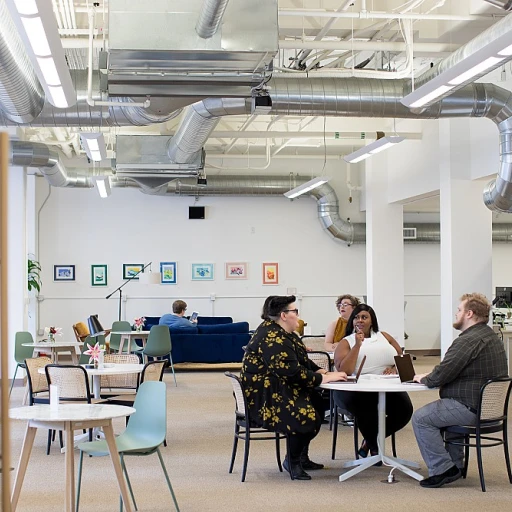
Understanding the Landscape of Professional Mentoring
The Evolving Dynamics of Professional Mentoring
Understanding the landscape of professional mentoring involves recognizing the shift towards a more dynamic and holistic approach in how knowledge and skills are transferred within the workplace. Modern mentoring is no longer confined to a simple transfer of information from a senior to a junior employee or student. Instead, it embraces a variety of techniques that cater to the needs of today's fast-paced business environment, enhancing both learning and leadership development.
In recent years, mentoring has evolved to accommodate a diverse range of learning paths. These include real-time problem solving, collaborative learning, and personalized learning experiences. As organizations strive to stay competitive, continuous learning and skill development are becoming indispensable components of their strategic plans, focusing not only on job-specific skills but also on critical soft skills like decision making, leadership, and team collaboration.
Moreover, the integration of cutting-edge technology in mentoring programs has resulted in effective learning development solutions. Data analytics, for instance, play a significant role in designing learning strategies and tracking the progress of skills development amongst employees and students. By utilizing data and technology, organizations can gain valuable insights that inform the creation of personalized mentoring programs suitable for different learning preferences and career goals.
This modern approach to mentoring is proactive, placing a strong emphasis on continuous skill enhancement and the design of innovative training programs. Such programs focus on the long-term development of employees by incorporating feedback loops and assessing outcomes against best practices.
To gain a deeper understanding of how professional growth can be enhanced through structured mentoring approaches, consider exploring resources that delve into strategic professional growth methodologies, like those discussed in the article on enhancing skills through clinical supervision and professional growth.
Identifying Key Skills for the Modern Workplace
Pivotal Skills Required for Today's Workforce
In a rapidly evolving business environment, the ability to adapt and grow through continuous learning and skill development is essential for success. Emphasizing key skills ensures that both employees and students can navigate the complexities of the modern workplace effectively. Here are some insights into the essential skills that are currently shaping industries:
- Problem Solving: As the cornerstone of leadership and innovation, problem-solving skills enable individuals to identify issues, devise strategies, and implement solutions efficiently. This skill is critical in making informed decisions and designing effective learning paths.
- Leadership: Leadership development plays a crucial role in shaping future leaders. It encompasses guiding teams, making strategic decisions, and fostering an inclusive and high-performing work culture.
- Data Literacy: With data increasingly driving business decisions, understanding and leveraging technology to analyze data can significantly enhance an employee's contribution to their team and organization.
- Continuous Learning: The concept of lifelong education is more important than ever. Encouraging continuous learning and embracing digital learning experiences allows professionals to stay current with industry trends and best practices.
- Collaboration and Teamwork: Collaborative learning not only boosts individual skill sets but also strengthens team dynamics. Through real-time feedback and support, teams achieve greater heights together.
Recognizing these key areas supports a comprehensive skill development strategy that aligns training programs with business goals. To further explore the significance and application of these skills, you may find value in becoming a CNC machinist as a practical, in-depth example of skill acquisition in today's industries.
Leveraging Technology in Mentoring
Adopting Technological Advancements for Effective Mentoring
In the ever-evolving landscape of learning and training, technology has significantly reshaped the way skills are enhanced. Successful employee development today is intricately tied to leveraging modern tools and platforms that facilitate flexible and impactful learning experiences. Let's delve into how various technological advancements are being harnessed to refine professional mentoring.
- Data-driven Insights: Utilizing data analytics to track employee progress and comprehend skill acquisition trends enables mentors to tailor their training programs. By analyzing data, mentors can design personalized learning strategies that address unique challenges, thus promoting effective skill development.
- Digital Learning Tools: Digital platforms have become instrumental in delivering training content and facilitating collaborative learning. These tools allow for a more interactive and engaging educational experience, offering real-time solutions to problem-solving situations, which are vital for leadership development.
- Virtual Mentoring Sessions: Video conferencing and other communication technologies have made it possible to conduct mentoring sessions virtually, breaking geographical barriers and providing employees and students with access to diverse knowledge and expertise. This fosters a continuous skill enhancement environment where learning is not confined to a physical space.
- Adaptive Learning Systems: Incorporating adaptive learning systems can lead to more personalized learning paths. These systems adjust the content based on employee feedback and performance, ensuring that each learner receives the specific guidance required to excel in their roles.
Ultimately, harnessing these technological avenues not only enhances the process of knowledge transfer but also builds a foundation for continuous learning and skill development. As organizations strive to remain competitive, integrating technology into mentoring strategies becomes a critical component in cultivating a culture of development and innovation.
For more insights into modern mentoring techniques, particularly for individuals with unique career needs, explore our insights on career paths for highly sensitive individuals.
Personalized Mentoring Approaches
Adapting Mentoring for Individual Needs
In today's fast-paced business environment, personalized learning experiences are becoming increasingly vital. Mentoring approaches that cater to the individual needs of employees, students, and teams can produce remarkable outcomes in skills development and leadership.- Understanding Individual Learning Paths: Every learner has a unique journey. Effective mentoring strategies should consider diverse learning paths and tailor programs to meet distinct learning preferences and goals. This involves integrating data and insights to shape training development methods that enhance decision making and problem solving abilities.
- Emphasizing Real-Time Feedback: Real-time feedback mechanisms can fortify the mentor-mentee relationship, fostering a culture of constant improvement. Constructive feedback should be an essential component of development journeys, providing mentees with actionable insights to refine their skills consistently.
- Designing Skills-Based Training Programs: Leveraging technology to design cutting-edge training programs that focus on specific skills can amplify their relevance and impact. By targeting skills crucial to individual roles, personalized mentoring can address immediate training needs, ensuring continuous learning and development.
- Promoting Collaborative Learning Experiences: In addition to one-on-one mentoring, incorporating collaborative learning tools can enrich the overall education process. Team members can embrace shared knowledge experiences that enhance skill acquisition and support business objectives.
- Creating Dynamic Leadership Development Solutions: For employees aiming for leadership roles, personalized mentoring can play a critical role. Through bespoke leadership development plans, mentors help mentees cultivate the leadership skills necessary to thrive in a competitive landscape.
Building a Feedback-Driven Mentoring Culture
Creating a Feedback-Rich Learning Environment
In a dynamic business environment, nurturing a feedback-rich culture is paramount for fostering continuous learning and skill development. Effective mentoring hinges on the ability to provide and receive constructive feedback, ultimately leading to enhanced learning experiences and personal growth.- Promoting open communication: Encouraging open communication allows mentors and mentees to share insights candidly, bridging gaps in understanding and facilitating a supportive training development ecosystem. Communication empowers employees and students to express their learning needs and challenges.
- Utilizing data-driven insights: Leveraging data and analytics can offer valuable insights into employees' and students' skill levels and learning paths. By integrating technology, mentors can provide personalized feedback, siding with continuous learning strategies over one-size-fits-all approaches.
- Designing structured feedback loops: Implementing structured feedback loops ensures that essential feedback reaches the mentees in a timely manner. These loops support real-time skill development, allowing teams to make informed decisions and refine their skills collaboratively.
- Encouraging leadership engagement: Leadership development plays a crucial role in mentoring systems, where leaders can model best practices for giving and receiving feedback. This guidance aids in creating an environment where feedback is seen as a tool for business and personal growth, rather than criticism.













